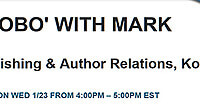
While authors and industry experts on both sides of the table have almost come to a consensus that there are benefits to both self-publishing and traditional publishing, it almost feels as though some more hardcore fans of either side still won’t lay to rest their original sentiments about the other camp. Publisher’s Weekly took note of a recent promotion by Amazon of a traditional-turned-indie author, what some in the industry are now referring to as a hybrid author, and the tone of the original announcement by Amazon is almost inflammatory.
Amazon posted the publishing journey of author Vincent Zandri, who admittedly had a rocky start in what was almost an illustrious traditionally published career. After being promised a $250,000 advance, a number so high compared to some advances now that it’s almost laughable, his novel never went where he thought it would because of cost-cutting in the traditional publishing industry, especially within the major publishing houses. His book was published with little fanfare, and the sequel was never even released in hardcover.
Amazon’s post went on to explain how the Kindle Direct Publishing option became a lifesaver for Zandri, who met up with a smaller publisher who bought the rights to both of his books and republished them via Kindle. And while this story has a happy ending for Zandri and his writing career, it ultimately feels like more of the finger-pointing that once kept self-publishing and digital-only published authors away from the cool kids table in publishing.
Now that the traditional publishing industry is beginning to embrace self-published authors, seeing them as a talent pool of writers who come complete with their own firmly established followings and fan bases, it almost feels like the self-published authors want nothing to do with the industry they once couldn’t join. While acknowledging that a high number of hybrid authors are still hoping to be “discovered” and picked up by a traditional publisher a la Amanda Hocking or Tina Reber, it’s beginning to look as though the self-published authors are collectively telling the industry that once wouldn’t let them in: “You had your chance.”
While it’s a strong testament to how self-published and hybrid authors are managing their careers, it also seems to be a contradiction. Only a few years ago when self-publishing was wrangling to even be recognized as a viable option for publication, the one thing industry watchers kept hearing was that there are valid reasons for both publishing models, and self- versus traditional should be determined on a book by book basis.
It is interesting that Publisher’s Weekly’s headline is about Amazon promoting Zandri as being a “self-published author,” despite the information in the Amazon post that Zandri had a “big publishing” deal, then went on to sign with a much smaller publisher who put Zandri’s original titles out via Kindle. There is no indication that Zandri was ever on his own with the fate of his novels squarely in his hands. This is probably just semantics, but the PW post was about Amazon flaunting self-publishing, rather than about how it is directing readers to a great book.
Mercy Pilkington is a Senior Editor for Good e-Reader. She is also the CEO and founder of a hybrid publishing and consulting company.
